"So then you are no longer strangers and aliens, but you are fellow citizens with the saints, and are of God’s household, 20 having been built on the foundation of the apostles and prophets, Christ Jesus Himself being the corner stone, 21 in whom the whole building, being fitted together, is growing into a holy temple in the Lord ..." (Ephesians 2:19-21)
This lesson provides the hymn story and principal biblical allusions for "Christ is Made the Sure Foundation" written by John Mason Neale.
Consider. Consider these words translated from 7th century Latin:
"Christ is made the sure foundation,
Christ the head and cornerstone; chosen of the Lord and precious, binding all the church in one; holy Zion's help forever, and her confidence alone." -- John Mason Neale (Ref. 1, Ref. 2, Ref. 3 below) Hymn Writer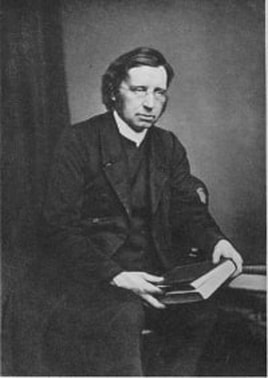 John Mason Neale (1818-1866) (Ref. 4) John Mason Neale (1818-1866) (Ref. 4)
John Mason Neale (1818-1866) was an English Anglican priest, scholar, and hymn writer (Ref. 4). Neale is best known as a hymn writer and translator, having enriched English hymnody with many ancient and medieval hymns translated from Latin and Greek (Ref. 4). Neale's best-known translations of hymns and Christmas songs include: "All Glory, Laud, and Honor," "Come, Ye Faithful, Raise the Strain," "Of the Father's Love Begotten," "Christ is Made the Sure Foundation," "Good Christian Men, Rejoice," and "Good King Wenceslas" (Ref. 5).
John Mason Neale translated "Christ is Made the Sure Foundation" in 1851 from the second part of the 6th or 7th century Latin monastic hymn, "Urbs beata Jerusalem" (Ref. 2). This hymn now is commonly sung to the tune of Westminster Abbey by Henry Purcell (1659-1695) (Ref. 2, Ref. 6) or the tune of Regent Square composed by Henry Thomas Smart (1813-1879) (Ref. 2, Ref. 7). Biblical Allusions
For the following discussion of the biblical allusions in "Christ is Made the Sure Foundation," please refer to the text of the four hymn verses in the attached hymn sheet (Ref. 3 below, Ref. 8).
"Christ is made the sure foundation" (hymn, verse 1)
The foundation of the church and our lives is Jesus Christ himself. John Mason Neale likely had Ephesians 2:20 and 1 Corinthians 3:11 in mind. In 1 Corinthians 3:11, the Apostle Paul writes, "For no man can lay a foundation other than the one which is laid, which is Jesus Christ." In Ephesians 2:19-20, Paul writes, "So then you are no longer strangers and aliens, but you are fellow citizens with the saints, and are of God’s household, 20 having been built on the foundation of the apostles and prophets, Christ Jesus Himself being the corner stone."
Jesus Christ is the sure foundation of the church and of our lives as believers in Christ. All of God's truth about salvation and the teachings of the Apostles are firmly based on him (1 Corinthians 3:10-11, Ephesians 2:19-21, Thayer's Greek Lexicon - Ref. 9). "Christ the head and cornerstone" (hymn, verse 1)
Christ at the same time is both the head of the church and the cornerstone of God's household. Paul describes our Lord Jesus Christ as the head of the church in both Ephesians 1:22 and Colossians 1:18. "And He [God the Father - Ephesians 1:17] put all things in subjection under His feet, and gave Him as head over all things to the church (Ephesians 1:22, brackets added). "He is also head of the body, the church ..." (Colossians 1:18).
Jesus Christ also is the cornerstone of God's household [literally, God's family] (Ref. 10). "So then you are no longer strangers and aliens, but you are fellow citizens with the saints, and are of God’s household, 20 having been built on the foundation of the apostles and prophets, Christ Jesus Himself being the corner stone ..." (Ephesians 2:19-20). "Chosen of the Lord and precious" (hymn, verse 1)
Both 1 Peter 2:4 and 1 Peter 2:6 describe Christ as chosen and precious. 1 Peter 2:4 tells us that even though Christ was rejected by men, he was "choice and precious in the sight of God." 1 Peter 2:6 goes on to say that the Lord Jesus is the chosen and precious cornerstone described by the prophet Isaiah. "Behold, I am laying in Zion a choice stone, a precious cornerstone, And the one who believes in Him will not be put to shame" (1 Peter 2:6 quoting Isaiah 28:16).
"Binding all the church in one" (hymn, verse 1)
"Binding the church in one" is a great theme of Ephesians 2:11-22. By the blood of Christ, our Lord Jesus has made both groups (Jews and Gentiles) into one, breaking down the barrier of the dividing wall (Ephesians 2:13-14). Jesus Christ himself has reconciled Christian believers of all demographic characteristics into one body through the cross (Ephesians 2:16, Ephesians 4:4-6).
"Laud and Honor to the Father" (hymn, verse 4)
John Mason Neale concludes the hymn with these joyous words of praise to our triune God:
"Laud and honor to the Father, laud and honor to the Son, laud and honor to the Spirit, ever three and ever one; one in might and one in glory, while unending ages run." -- John Mason Neale (Ref. 3 below; Ref. 8) Praise God that Jesus is with us always, even to the end of the age (Matthew 28:19-20).
Prayer
Thank you, Father, for providing your Son to be the foundation of our lives. Thank you, Jesus, for being the cornerstone of your church, uniting all believers in you into one body through your blood shed on the cross. Thank you, Holy Spirit, for fitting us together as living stones into one holy temple where we worship you and give you -- Father, Son, and Holy Spirit -- all the praise and glory. Amen.
Listen and Sing Along
Listen to and sing along with "Christ is Made the Sure Foundation" (Westminster Abbey tune) sung at St Machar's Cathedral, Aberdeen, Scotland.
References
1. https://www.hymnsite.com/lyrics/umh559.sht 2. https://en.wikipedia.org/wiki/Christ_is_Made_the_Sure_Foundation 3. The United Methodist Hymnal, The United Methodist Publishing House, 1989 4. https://en.wikipedia.org/wiki/John_Mason_Neale 5. https://www.hymnsandcarolsofchristmas.com/Hymns_and_Carols/Biographies/john_mason_neale.htm 6. https://en.wikipedia.org/wiki/Henry_Purcell 7. https://en.wikipedia.org/wiki/Henry_Smart 8. https://www.ministrymatters.com/files/760/Christ%20Is%20Made%20the%20Sure%20Foundation.pdf 9. https://biblehub.com/greek/2310.htm 10. https://biblehub.com/greek/3609.htm 11. https://biblehub.com/greek/444.htm
1 Comment
This article teaches about the biblical passages that Isaac Watts referred to when he wrote the poem that we now know as "Joy to the World."
Introduction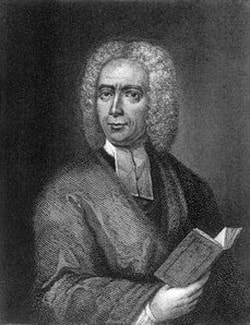 Isaac Watts (1674-1748) (Ref. 2) Isaac Watts (1674-1748) (Ref. 2)
In 1719, Isaac Watts published a poem about Psalm 98:4-9, Psalm 96:11-13, and Genesis 3:17-18. He titled the poem, The Messiah's Coming and Kingdom (Ref. 1, Ref. 2). Today we know that poem by the title, "Joy to the World," from the first line of the first verse:
"Joy to the World; the Lord is come! Let earth receive her King! Let ev'ry heart prepare Him room, And Heaven and nature sing." (Ref. 1) More than a century later, in 1836, Lowell Mason set the words of the poem, "Joy to the World," to music (Ref. 3). Musically, Mason borrowed the first four notes for his tune from the chorus, "Lift Up Your Heads," in Handel's Messiah (Ref. 1). As of the late 20th century, "Joy to the World" was the most-published Christmas hymn in North America" (Ref. 1). Scriptures for "Joy to the World"Psalm 98:4-9 KJV -- "Make a joyful noise unto the Lord, all the earth: make a loud noise, and rejoice, and sing praise. (5) Sing unto the Lord with the harp; with the harp, and the voice of a psalm. (6) With trumpets and sound of cornet make a joyful noise before the Lord, the King. (7) Let the sea roar, and the fulness thereof; the world, and they that dwell therein. (8) Let the floods clap their hands: let the hills be joyful together (9) Before the Lord; for he cometh to judge the earth: with righteousness shall he judge the world, and the people with equity."
Psalm 96:11-13 KJV -- "Let the heavens rejoice, and let the earth be glad; let the sea roar, and the fulness thereof. (12) Let the field be joyful, and all that is therein: then shall all the trees of the wood rejoice (13) Before the Lord: for he cometh, for he cometh to judge the earth: he shall judge the world with righteousness, and the people with his truth."
Genesis 3:17-19 KJV -- "And unto Adam he said, Because thou hast hearkened unto the voice of thy wife, and hast eaten of the tree, of which I commanded thee, saying, Thou shalt not eat of it: cursed is the ground for thy sake; in sorrow shalt thou eat of it all the days of thy life; (18) Thorns also and thistles shall it bring forth to thee; and thou shalt eat the herb of the field; (19) In the sweat of thy face shalt thou eat bread, till thou return unto the ground; for out of it wast thou taken: for dust thou art, and unto dust shalt thou return."
The beautiful carol, "Joy to the World," that we love to sing at Christmas actually is more about the second coming of Christ than the first (the incarnation - John 1:14). Psalm 98:4-9 and Psalm 96:11-13 glorify Christ's triumphant return at the end of the age. The Apostle Paul, writing after the first coming of Christ, tells us the whole creation still groans and is subject to corruption (including destruction and decay) (Romans 8:21-22, Ref. 4). The time still is in the future when the sea will roar in praise, the floods will clap their hands, and the "trees of the wood" will rejoice when Christ comes to judge the world (Psalm 98:7-9, Psalm 96:12-13). Verses 1 and 2 of "Joy to the World" look forward to this time of rejoicing.
When Christ comes again he will establish his reign upon the earth. He will judge (the Hebrew word means to act as law-giver, judge, governor) the world with righteousness, truth, and grace (Psalm 98:9, Psalm 96:13, John 1:14, Ref. 5). Verse 4 of "Joy to the World" expresses this truth.
Genesis 3:17-19 describes the curse that God announced to Adam after Adam had sinned by eating the fruit from the forbidden tree. This passage specifically mentions the curse on the ground, the sorrow that Adam (mankind) will have toiling the ground, and that the ground will grow thorns (Genesis 3:17-18). In Verse 3 of "Joy to the World," the hymn looks forward and says, "No more let sins and sorrows grow, nor thorns infest the ground." When Christ comes, he "will make his blessings flow ... far as the curse is found." We can receive Christ's blessings now and become free from the eternal curse of sin by putting our faith, confidence, and trust in him today (Ephesians 2:8-9, Romans 3:23-24, John 11:25-26).
Hymn Writer and Composers for "Joy to the World"Three different men from three different backgrounds have collaborated in mind and spirit to create the carol, "Joy to the World," that people have enjoyed for more than 180 Christmases. Isaac Watts (1674-1748) was an English Independent (Congregational) minister, theologian, and a prolific and popular hymn writer. Watts composed more than 700 hymns (Ref. 2). Many of his hymns remain in use today including "When I Survey the Wondrous Cross," "From All That Dwell Below the Skies," and "Marching to Zion" (Ref. 2). 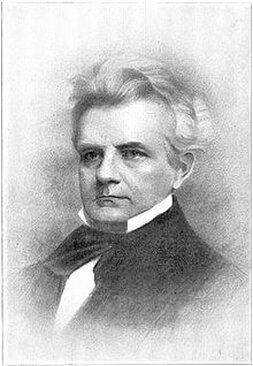 Lowell Mason (1792-1872) (Ref. 3) Lowell Mason (1792-1872) (Ref. 3)
Lowell Mason (1792-1872) was an American choir director, music educator, and composer in Boston and New York City (Ref.3). In 1836 he rearranged a section of Handel’s "Messiah" to fit the words of "Joy to the World." That familiar hymn tune we sing today for "Joy to the World" is named Antioch (Ref. 1). Lowell Mason also is known for his hymn tune, "Nearer, My God, to Thee," and for the melody he created for the nursery rhyme, "Mary Had a Little Lamb" (Ref.3).
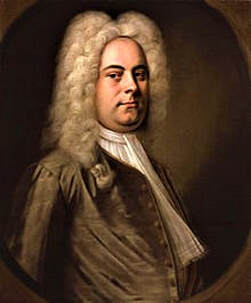 George Frideric Handel (1685-1759) (Ref. 6) George Frideric Handel (1685-1759) (Ref. 6)
George Frideric Handel (1685-1759) was a German, later British, Baroque composer who spent the bulk of his career in London (Ref. 6). Handel composed his masterpiece oratorio, Messiah, in 1741 (Ref. 7). Lowell Mason's Antioch tune for "Joy to the World" borrows the first four notes from the chorus, "Lift Up Your Heads," in Handel's Messiah (Ref. 1).
Even though Isaac Watts wrote "Joy to the World" about the second coming of Christ, "Joy to the world" applies to us today when we celebrate the first coming of Christ. First, our hearts are to "prepare him room" (Luke 2:7, Verse 1). Second, we are to celebrate the "wonders of his love" (Verse 4). The Bible tells us about God's wonderful love -- "God so loved the world that He gave His only begotten Son, that whoever believes in Him should not perish but have everlasting life" (John 3:16).
Consider
Have you prepared room in your heart for Jesus? (Luke 2:7) Have you received Jesus who came to save you and me from our sins? (Matthew 1:20-21) Are you prepared to meet Jesus Christ joyfully when he comes to judge the world? (Psalm 98:4, 9; Psalm 96:11, 13)
References
1. https://en.wikipedia.org/wiki/Joy_to_the_World 2. https://en.wikipedia.org/wiki/Isaac_Watts 3. https://en.wikipedia.org/wiki/Lowell_Mason 4. https://biblehub.com/greek/5356.htm 5. https://biblehub.com/hebrew/8199.htm 6. https://en.wikipedia.org/wiki/George_Frideric_Handel 7. https://en.wikipedia.org/wiki/Messiah_(Handel) |
Daily Bible Verse(Click the link above) AuthorMr. Whitney V. Myers. Christian. For more information, please visit the Author Page. Posting ScheduleI plan to provide new postings about once a month. Planned Topics(subject to change) Recent Posts(most recent three months) Popular Posts(top 10) Categories
All
Archives
July 2024
|
|
Copyright 2018-2024 Whitney V. Myers |
Listed in Feedspot's Top 100 Bible Study Blogs and Websites |
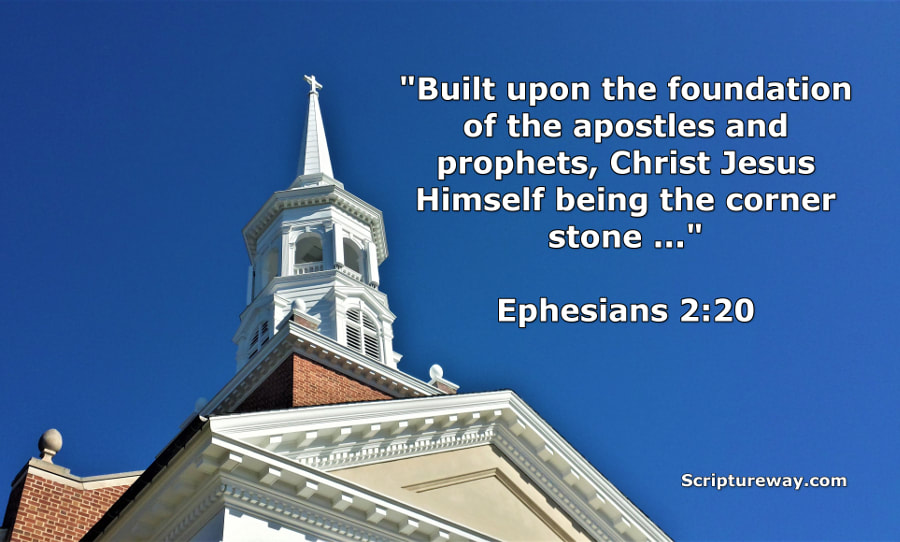
 RSS Feed
RSS Feed
